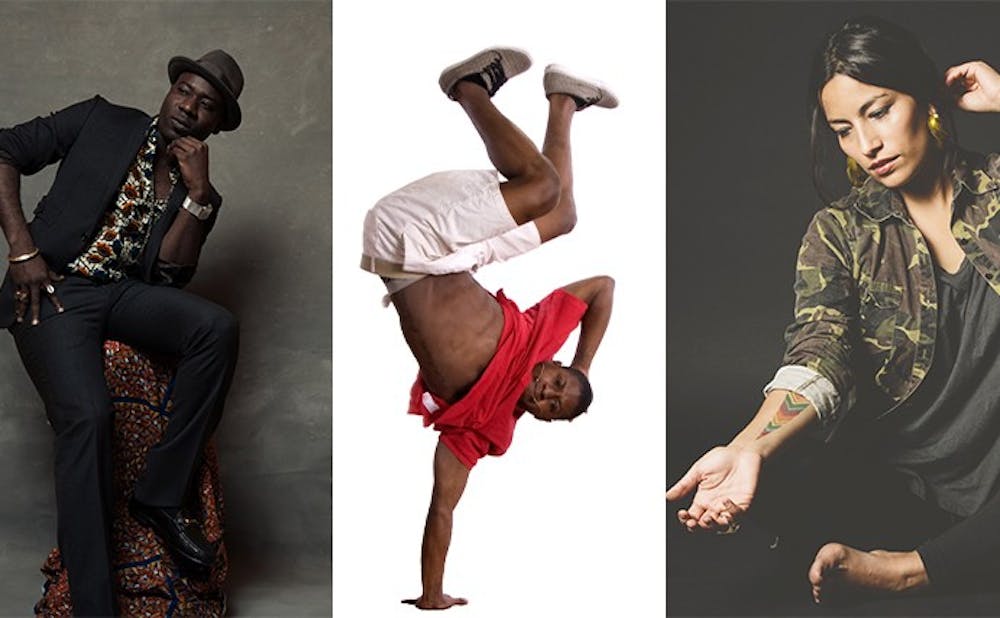Since its inception a few decades ago, hip hop has grown to become both a dominant force in our sociocultural dialogue and a continuously developing form of expression for a variety of artists across the globe. Consequently, Duke Performances is holding a spotlight on the genre this year that will culminate in talks, class visits, master classes and performances from high profile, internationally-acclaimed rappers and dancers.
“Hip hop has proven its staying power, its international influence, its capacity to articulate social and cultural concerns, its ability to innovate aesthetically,” said Aaron Greenwald, executive director of Duke Performances. “All of these things have made it the topic of discourse and focus in the academy.”
The two rappers featured this season are Blitz the Ambassador and Ana Tijoux. Blitz is a Ghanaian-American artist based in Brooklyn who resides in the socially conscious vein of hip hop. Tijoux is a Chilean rapper who is heavily engaged in women’s rights and politics in Latin America. The dance group Rennie Harris Puremovement will also be featured. The group has received rave reviews from multiple publications, including the New York Times.
This spotlight will potentially lend cultural exposure to many students who might discover or further cultivate an interest in hip hop. Francis Roberts, an adjunct assistant professor of music who teaches a class on hip hop and rap appreciation at Duke and is a hip hop artist himself, noted the spotlight’s potential capacity to educate students.
“The more opportunities we have to show the influence, the creativity and the relevance of hip hop music in our culture and even the Duke community, we’re able to show how the impact can be positive and long-lasting on a lot of these students,” Roberts noted.
Some former students of Roberts have switched focus after taking his class and are now pursuing careers in music.
Although students will likely learn much about hip hop technique and artistry from the guests’ talks, there will also be a strong interdisciplinary presence focused around social commentary. The artist residencies will include engagements with a variety of on-campus departments and groups, including Latino/a American Studies, African and African American Studies, the Center for Documentary Studies, Women’s Studies and the Africa Initiative.
The involvement of these groups promises to immerse students in hip hop’s multitude of lyrical themes and messages. Additionally, some of these artists offer an international perspective that would be difficult for students to find elsewhere.
“I think it’s very important to support artistry in whatever form,” Roberts noted. “If you like music and you have the opportunity to see some of these international artists, it’s always important to try to do so.”
In the past, Duke Performances has initiated programs that were similar in their focus on a specific aspect of artistry. For instance, one project engaged materials out of the David Rubenstein Rare Book and Manuscript Library and another explored African American gospel music. There is also one more season of hip hop residencies planned for next year. Depending on the student response, Duke Performances might make residencies and performances of internationally acclaimed hip hop artists a continued habit.
“While it’s not something that we do every year, thematic presenting is often a meaningful method for going deeper with our patrons and drawing out academic engagement,” Greenwald noted.
Professor Roberts echoed how this kind of presentation might be helpful for students, especially ones who are thinking about pursuing musical careers in hip hop. In his experience developing as a hip hop artist, he has found competition from his contemporaries to be the most helpful in aiding his own artistic evolution. Consequently, performances from international artists might stimulate the Duke hip hop community.
The spotlight should be interesting and stimulating even for students who are not necessarily into hip hop. The genre has a cultural and societal hold that has only increased in recent years, introducing it into conversations on a broad range of topics. As a result, the entirety of the student body could most likely benefit from the Duke Performances spotlight on hip hop.
“I hope that Duke students gain increased appreciation for a now global art form,” Greenwald said. “I hope that all of our audiences will be entertained, educated and transported.”
Get The Chronicle straight to your inbox
Signup for our weekly newsletter. Cancel at any time.

